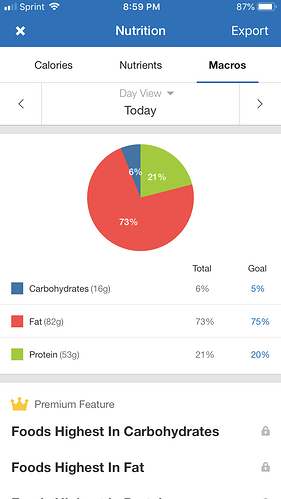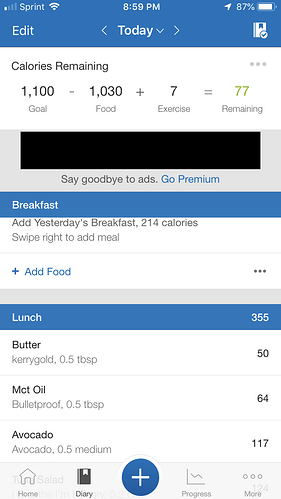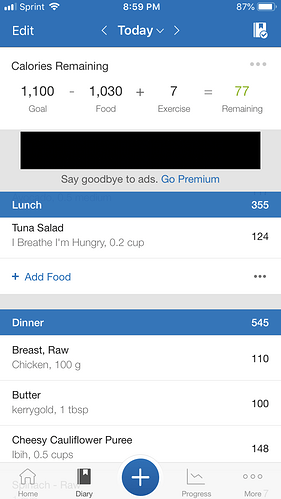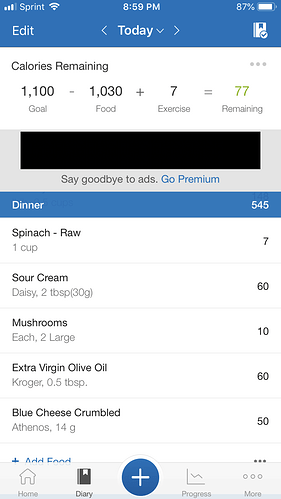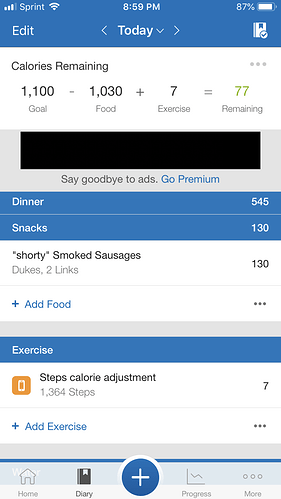Hi all. I’m so new to this form of dieting but really want to make it successful for me and my lifestyle as a permanent, lifelong eating habit. This is what I ate today, and I am going to bed feel like I over ate probably? Also feel bloated and haven’t had a BM in a few days (sorry for the tmi), so overall not great. But the headache and such is gone. I want to give this my all, what am I doing wrong? Also, bear with me, I have to put one image via every message since I’m new.
Second day on Keto. Care to look at my log today and tweak it for me?
That’s fine, kind of a low protein macro. But it could be appropriate. Most all advice you’re going to get at this point will tell you to focus on keeping your carbs under 20 grams a day, mostly from low carb leafy green veggies. I will link a list at the end. Eat moderate protein to keep your muscles from loosing mass and be satisfied, and use liberal healthy fats cooking and putting on your food. Don’t overdo it just butter on broccoli, scrambled eggs bacon with the yummy bacon grease, coconut oil, olive oil. Eat avocado if you like it. Pretty easy and you don’t need to stress about making all your macros perfect especially at the beginning. 
Starting Keto just focus on keeping your carbs below 20. Focus on your macros after that.
Shannon,
Most importantly, kudos on going food-first into low-carb eating!
So many people think they understand what low-carb eating means. It is, as you will most likely find, a radical shift from standard American eating. It will require significant body and mind adjustments along the way. And you know what? That’s awesome. Life is fantastic when you make it to the “fat-adapted” side.
So, here’s my food critique, which I hope is helpful.
- You don’t need MCT Oil. It’s a nice-to-have but unnecessary. You can get MCT Oil from coconut oil, and you don’t need to worry about the extraction process that renders MCT Oil. Everything you need is at your corner grocery store.
- Chicken breast. Not bad, but better: dark meat. Thighs. Glorious chicken thighs. Catch the schmaltz, too, from the cooking process. It’s delicious and good for you.
-
Kerrygold is nice, but, again, you’ll be fine with plain old butter. Our family buys Aldi butter. I eat it by the stick. Mmmm, getting hungry, false signals!

- “Cheesy cauliflower puree” getting hungry again. If this was bought as a manufactured product, watch the cheese ingredients. Lots of garbage goes into process cheese.
As an aside, you might want to consider switching from MFP to Cronometer. There are fewer food items in Cronometer, but it is far more accurate. I used MFP religiously from 2011 to 2017 when forum members convinced me to switch. Even though there are fewer food items in the Cronometer database, the information is far more accurate. That said, I follow Dr. Westman’s Page Four. I’ve stopped tracking but I will use cronometer to help me measure carbs in a food.
Finally, I count total carbs per day, not net.
Thanks for this! By total carbs do you mean total carbs and not minus the dietary fiber? Also, check out the cheesy cauliflower recipe for IBreatheIEat.com, it is SO good and not something you buy. Better than mashed potatoes. I will look into that site.
Do you mean under 20 g after taking away dietary fiber? For instance, an avocado has such a big difference! Which is it?
According a recent forum poll, about 60% of forum voters use net carbs (total - fiber). I find that I can eat more vegetables with net and it just seems odd to me to say “I can’t have broccoli today” or “I ate too much cauliflower”. You can try net carbs or total carbs and see for yourself which works best for you.
I will say one thing about the bloating… it could be from the MCT. MCT can cause gastrointestinal disorder in some people. Sometimes less is better. Sometimes none is better. Personally, I do use some coconut oil but even that can cause digestive issues in some people.
And btw, Welcome to the forum and a new lifestyle. 
Thank you for your response. What is your opinion on “bulletproof” coffee? I tried it and found that it was an easy way to cut carbs/get fats, while also feeling satiated, but I of course am using 1/2 TBS of butter/oil right now. Thoughts?
Don’t drink BPC to “game” your macros. Eat to satiety and stay below 20 TOTAL (including fiber, unicorn and sparkly) carbs. Your macros will be fine. That said, I enjoy BPC and, very soon, BPT (I give up coffee for lent) because I like the taste. Set the amount of butter or coconut oil to what you believe to be the most delicious. I use 4 tablespoons, but I’m confident we’re quite different in taste and physiology.
I’m in the middle of the road on this. In principle, I can agree with people who say to spend your calories on real food but I’ve also read a lot science-backed articles that show MCT can have positive impacts on brain health as well as aid in fat burning and reducing inflammation.
My personal compromise is to use coconut oil when I cook protein but not for veggies because I don’t like the flavor. For cooking veggies I prefer good old bacon grease. I also take about a total of a tablespoon’s worth of CO in my morning coffees and I like how it jumpstarts my brain and gets it going full tilt before I leave for work.
Lastly, I think if it helps you avoid from needing to eat a big meal to make it to lunch, especially while your body is transitioning from being a carb burner to a fat burner, then why not do it now and decide later if you really need it.
Same with me, Carl. I’ve always been a veggie person and I like leafy greens. I honestly feel for myself, that my fatloss is accelerated with a good amount of raw leafy greens per day. I try to do 7 cups. It’s very fat flushing for me and my liver enjoys it.
I’m so appreciative of all of these replies and opinions. Thank you for the warm welcome and help.
Here’s the thing I’m skeptical about. There’s solid evidence that MCT Oil is beneficial. That doesn’t mean MCT Oil, however you get it. If it’s already in coconut oil, I’ll let my body perform the extraction, not a chemical machine process.
Of course, I could be wrong.
I’m pretty sure we both graduated from the same school of thought. Lately, I’m quite biased against anything that has the word processed attached to it.
Yeah I think not all MCT Oil extract is created equal. In fact I believe if you use it, you’re supposed to seek out the kind not extracted by means of harmful things (aka the more expensive kinds and not the kind you find at Walgreens).
I feel, especially if you’re beginning Keto, to not even bother with MCT oil extracts because don’t we want our own fat to be used as fuel? If you’re reason is mostly fatloss, I think the MCT extracts should be held off on. But maybe I’m wrong, too.
I really like @juice’s beginners guide:
Keto is This Easy
Quick VersionThis is for Phase One - the starter phase. It’s still not complicated later, but this is the really easy to explain version which will help you no end.
Eat under 20g of carbs a day
Don’t worry about the scale. All it tells you is weight, it tells you nothing about body composition, even the “smart” scales.
Eat plenty of good food - fat and protein - while adhering to 20g/carbs/day. Don’t worry too much about macros and calories EXCEPT carbs. Keep them below 20g/day. (Prioritise the animal protein (i.e. not protein powder) - always start with protein in every meal, but don’t panic about it.) Your job is to get fat-adapted, so give your body the fuel you want it to use. Also, your appetite will vary - it’ll disappear, then it’ll come roaring back. Happens to most people, don’t sweat it.
ELECTROLYTES/SALT - KEEP THEM UP
Keto is not a quick-fix fad diet, it is a long-term repair job on your body. This means that for many, it is not an immediate and sustained weight-loss diet. But these repairs can take months. This is because your body is healing, and it prioritises that requirement over your weigh-loss desires because it’s smart. GIVE IT TIME WHILE YOU RECOVER FROM DECADES OF CARB-CAUSED ABUSE.
Buy the meat you can afford - don’t stress about grass-fed, organic (con), etc… The worst meat is better than the best bread.
Fasting is a tool. Nothing more, nothing less. Works for lots, not for others. Don’t let tools tell you to use it before you’re fat-adapted and it makes sense.
This site has a search function (magnifying glass at the top of the page) and a newbies section - use them both, you’ll get a better variety of answers to your questions far more quickly that way. SERIOUSLY, THIS IS VERY USEFUL.[1]
That’s as difficult as it needs to be for a couple of months.
My good friend Terence (being friends with a Kiwi feels kinda dirty, but there you have it, keto makes for strange bedfellows) tells me this thing I have described above is called “dirty keto.” So yeah, do dirty keto, kids! 
It’s rare that I find myself NOT having broccoli or cauliflower, but, one can have too much cauliflower. As Dr. Westman recommends, 2 cups of salad greens and non-starchy veggies, 1 cup of non-starchy veggies.
Is 3 cups of veggies not enough? It hasn’t been my experience.
I would agree to that, after you have become fat adapted. The less fat in our belly, the more likely the fat on our belly will be used for fuel.

